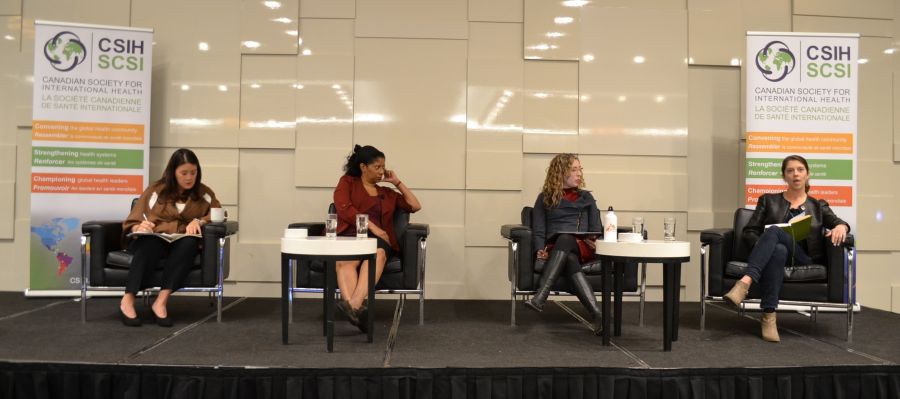
By Amelia Monstad
“Everything is connected, which seems the only way forward in global health.” Dr. Courtney Howard, an emergency physician and climate advocate, summed it up well during the closing plenary of the Canadian Conference on Global Health, when discussing the critical links between health outcomes and the changing climate. But this message resonated throughout all of the sessions that I attended at this year’s conference: working effectively in global health necessitates working across traditional sector boundaries.
In a session How is the world faring? on the health-related Sustainable Development Goals, speakers Zulfiqar Bhutta and Fahad Siddiqui from the Hospital for Sick Children and Qamar Mahmood from the International Development Research Centre (IDRC) highlighted that it is important to build capacity to work across sectors, which was noted to be lacking when countries try implementing the health-related SDGs at the local level. This seemed like an important point to pick up on as we consider implementing projects abroad and our ability, as a planet, to reach the Goals. While it may sound intuitive to combine health and water, or security and health to achieve the best outcomes, these research outcomes from the SDG Voluntary National Reviews showed that it continues to be difficult in practice.
A separate symposium on Water security at the intersection of health and governance gave examples of different sectors that need to work together, notably Water, Sanitation and Hygiene (WASH), Health, and Governance. Research by Thelma Zulfawu Abu, a PhD candidate at the University of Waterloo, looked at the Universal Health Coverage pilot in the Kisumu region of Kenya, where it was noted that this innovative project did not contain a WASH policy. It was argued that this should be a crucial sector to engage if the aim is to improve health outcomes through UHC. Ms. Abu also noted the importance of incorporating platforms to communicate and engage with ministry of health, NGOs, patients, community members – the need to collaborate better when the sectors do work together. This resonated with the Sustainable Development Goal session, focusing on the complexities of communicating between different stakeholders and across levels of government.
As a recent Global Health student, perhaps I took for granted that research and projects should incorporate many different sector perspectives. Global Health programs today teach the necessity of interdisciplinarity, and teams are often made up of diverse experts: doctors, statisticians, engineers. It is important that students understand global health in this context, so that they will be prepared to carry out their work alongside other sectors. The conference highlighted that this academic knowledge should translate to clear plans for intersectoral work on the ground, outside of academic best practices.
“We need to be open to vulnerability to do things differently,” Dr. Howard said later in her plenary. Perhaps this is the reason we see example after example of projects struggling to break down barriers: it takes vulnerability to step out of the normal order of business, working with the same players to achieve our global health goals. If we cannot do things differently, there will not be the progress that we so hope for towards the Sustainable Development Goals, and improving human health and livelihoods around the world.
A final takeaway from Dominique Souris, Executive Director of the Youth Climate Lab, was how “you learn so much from working with people not in your space.” This thought stuck with me as I left the conference: if all global health professionals can keep moving forward, learning and adapting by working with new colleagues in new spaces, then we do have a hope of reaching the Goals and onwards.
Thank you to the Canadian Coalition for Global Health Research Students and Young Professionals Network and Canadian Society of International Health for the opportunity to attend this year’s conference.
Amelia Monstad is a member of the Canadian Coalition for Global Health Research Students and Young Professionals Network, and works as a global health Campaigns Officer and advocate with RESULTS Canada.
Publié:
novembre 18, 2019
Auteur:
Canadian Society for International Health (CSIH)
Catégories:
Partager cette publication: